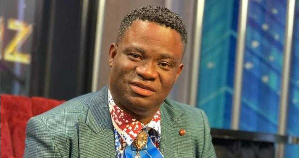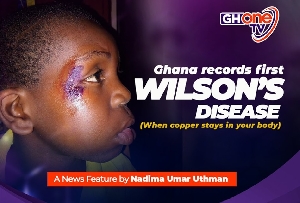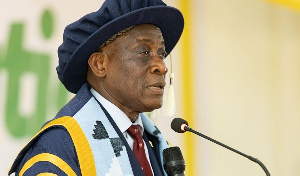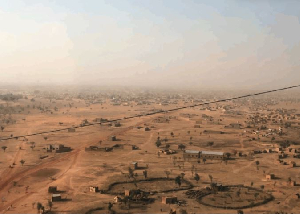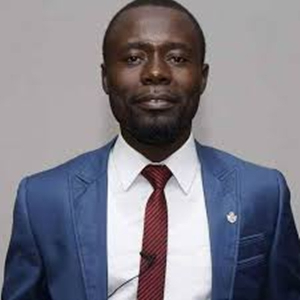When copper stays in your body.
At first glance, 14-year-old Mark Worwornyo appears like any other regular teenager.
But upon a closer look, one would notice something unusual in Mark’s body movements.
Mark is the only person in Ghana diagnosed with Wilson’s disease, a rare genetic disorder that threatens to paralyze him.
His mother, Faustine Worwornyo tells GHOne news' Nadima Umar Uthman that at ten years old, her son frequently stumbled while walking and suffered throat swelling
But what alarmed her the most was when her son’s writing skills severely deteriorated.
‘’At first, I would fight the teachers for not giving him enough time to complete his work but on one occasion, I went to school, took a photo of the homework, came home and asked him to write. He held the pen but couldn’t write anything,’’ she narrated.
As Mark grew, so did the disease and its accompanying symptoms, subjecting him to stigmatization.
‘’Some of the teachers even imitate my son for the other students to laugh. Even the headmaster called him a special needs child which I did not take kindly to,’’ she added.
He now struggles to articulate what he wants to say.
This is one of the symptoms of Wilson’s disease.
Mark and his family have gone through a long debilitating diagnostic journey which is very common in resource-constrained settings like Africa.
The quest for a diagnosis has financially burdened the family of five, relying on meagre income from masonry work and petty trading.
Six months ago, they finally received a diagnosis at the Korle Bu Teaching Hospital; their only son had excess copper retention in his brain and liver.
Faustine says she cried like never before. ‘’To make matters worse, doctors from the country’s top hospital were telling me this kind of disease cannot be treated in Ghana. My head was spinning.’’
Copper is present in many foods, but the human body requires only small amounts. However, for those with Wilson’s disease, the surplus copper leaves the bloodstream and accumulates in various organs and structures, such as the brain, spinal cord, eyes, liver, and kidneys.
Professor Eben Badoe is the head of neurology and developmental services at the Korle Bu Teaching Hospital and says Mark can die if he’s not treated on time.
Penicillamine, a medication, is known to slow down the progression of the disease but cannot provide a complete cure. Mark will require this drug daily for the rest of his life, and it comes with a cost of around 150 cedis each day.
But the family says they cannot afford this amount.
According to the research group, the Health Policy Partnership, rare diseases affect up to 400 million people across the world and, for many, there are no treatment options available. In Ghana alone, this translates to an estimated 3 million people living with rare diseases.
Professor Badoe says the hospital is seeing more cases of rare disorders like Wilson’s disease than in the past.
However, in a country with limited health infrastructure, most patients and caregivers are left with uncertainties regarding available treatment options, costs, and accessibility.
Available research indicates that at least 80 percent of rare diseases have an identified genetic origin.
Professor Badoe says that as more genetic cases are being recorded, Ghana must start investing in the field of genetics.
‘’These are huge investments but if we are moving forward as a country, then we can't stay behind the technology. Things can be explained now,’’ he submitted.
But while patients and caregivers wait for these investments to be made, the first group of genetic counsellors, the only one of its kind in sub-Saharan Africa, is being trained at the West African Genetic Medicine Center. This was revealed by the founding director, Professor Solomon Ofori Acquah.
To encourage early testing and diagnosis, Samuel Wiafe founded the Rare Diseases Ghana Initiative, an NGO leading advocacy for people with undiagnosed and genetic disorders.
His NGO has facilitated free laboratory testing for patients with rare genetic disorders through an access program. But, the need is still great.
Medical laboratory scientist in Accra, Michael Ackah agrees more financial support can make a huge difference.
‘’Before these tests are done in a country like ours, there has to be a need and sample size. Manufacturers will ask what your numbers are, if it's low, they won’t feel the need to bring their equipment here to work with the local labs,’’ he warned.
Rare disease advocates nationwide are calling on the Ghanaian government to support the adoption of the 2021 United Nations Resolution for people with rare diseases.
This resolution aims for Universal Health Coverage and also ensures that persons like Mark are not left behind when it comes to human rights, education, and employment.
Health News of Tuesday, 27 February 2024
Source: starrfm.com.gh
'When copper stays in your body' - Watch piece on Ghana's first Wilson’s disease victim
Entertainment
